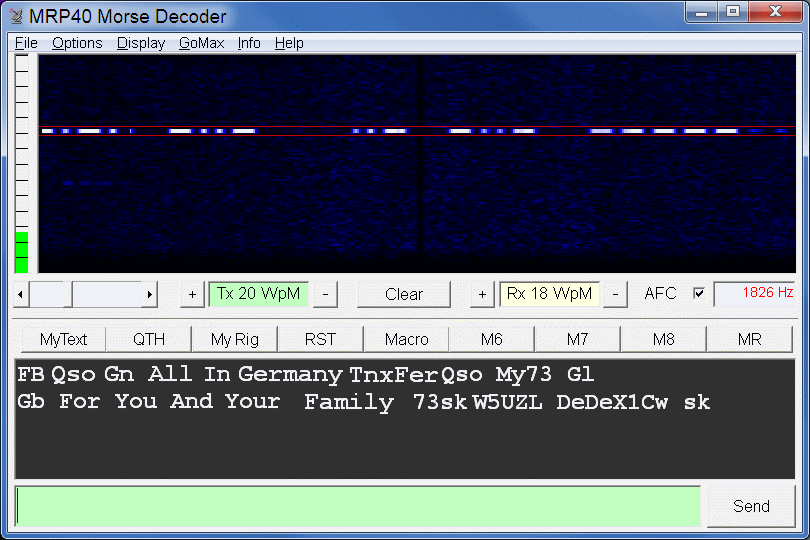http://www.polar-electric.com/Morse/MRP40-EN/index.htm
 |
 |

Deutsch Japan
MRP40 is a powerful and highly-effective ham radio software program that decodes received CW audio that has been fed to a computer’s sound card. The decoded text is displayed on the computer’s monitor. For transmitting CW, the program encodes keystrokes from the computer’s keyboard. Hams use MRP40 to send and read QRQ (high-speed) CW, to help read weak DX signals, and to improve CW contest scores.
There is now available a special SDR Version of MRP40 Morse Decoder for more info click here

- Compatible with
- SignaLink (highly recommended)
- Rigblaster Advantage (click here to see how to set)
- Microham USB Interface II and microHam microKeyer II
- US Interface Navigator
- Donners Digital Interface
- Or just do it yourself: Galvanic isolated PC to RIG interface
- Performance:
- Features:
Very good decoding of weak, noisy and fading signals
Almost 100% copy in heavy CW contest conditions and local QRM
Decoding now better than famous MRP37 Morse Decoder (MS-DOS version, no longer for sale!)
- Morse Code Decoding up to 60 WpM
- Text- and Graphic Display
- High performance software CW filtering
- Automatic speed recognition
- Automatic Gain Control (AGC)
- Automatic tracking of “drifting” signals (via AFC)
- A new feature automatic formats unspaced words read more…
- Transmitting Morse Code
0.4 to 60 WPM
There are two ways to transmit:
1. Recommended: Use AFSK (audio frequency-shift) keying by sending CW audio to the transceiver from the computer’s sound card. The rig operates in SSB transmission mode. The signals generated by MRP40 have sine waveform and a smooth envelope, so no annoying key clicks. The rise and decay times of the CW-signals are automatically adjusted to the sending speed, so a minimum bandwidth is occupied, especially for QRS (slow sending). Note: When using AFSK for sending, one can
2. Key your transceiver via the RS232 serial Com Port,
To ensure galvanic isolation between computer and transceiver, we recommend using an interface box from SignaLink
- System Requirements:
- Soundcard: any general purpose. ( e.g. PCI or On-Board Sound)
- CPU: Pentium 450 MHz or faster
- Operating System: Win95 / Win98 / WinMe / Win2000 / Win XP / Win 7 / Snow Leopard / Parallels Desktop 5
- Mac running OS X 10.7 and using Windows 7 running in Parallels 7
Windows 7 specific instructions:
Locate MRP40 at it’s Program folder location for example “C:ProgramsHamRadioSoftwareMRP40 Morse Decoder V62MRP40v62.exe”
Right click on the MRP40v62.exe file to access the properties
In the properties / compatibility table one must set: XP Service pack2
Right click on the MRP40v62.exe file to access the properties
In the properties / compatibility table one must set: XP Service pack2
Vista-specific instructions:
MRP40 can run under Vista only if launched directly from it’s Program folder location, typically “C:ProgramsHamRadioSoftwareMRP40 Morse Decoder V62MRP40v62.exe”
Right click on the MRP40v61.exe file to access the properties tab and select XP Service pack 2 or 3. This need be done only once; however, each time the program is run, one should right-click the .exe file and select “Run as administrator,” unless the User has administrative privileges.
Right click on the MRP40v61.exe file to access the properties tab and select XP Service pack 2 or 3. This need be done only once; however, each time the program is run, one should right-click the .exe file and select “Run as administrator,” unless the User has administrative privileges.
- – Apple iMac i7
– Parallels Desktop 5
- MRP4064:– PTT function can be disabled completely
– Bug Fix regarding USB to RS232 Serial Adapter: Now proper timing of first “Dot” during CW sending via ComPort
– Typing the ESC-key will stop the ongoing sending action and clear the Tx text box
– Mini Log Book integrated: A neatlitle tool to log your contacts. It automatically looks up previous contacts with recent call. It supports ADIF record format.
- To launch the MiniLogBook run MRP40 and click -Options -Show … -MiniLogBook
To learn more about comfortable operation refer to the Help Documentation. Run MRP40 and click
- – Help -English -User interface -Program Menu -Options -Show then scroll down to section “MiniLogBook”
- MRP4063:
– Graphic Display improved:
- – now double dynamic range for signal amplitude: color transists from black into bule into light blue into white (see screen shot above)
– now double frequency resolution: display of incoming signals is more sharp; much less side lobes visible.
– now double time resolution: length of short dots is displayed more accurately
– Default text font size is appied when window is resized
– Green Volume indicator for soundcard signal corrected:
- -the vertical display range now represents 1:1 the physical signal range of soundcard ( please keep volume moderate, avoid cliping at top )
- MRP4062:– Bugfix: Click noise during sending via soundcard eliminated
– Windows 7 Support added: Audio Control Panels (Mixer sndvol32.exe ) included in Installation Package
MRP4061:
– Sending is continued even if you work other applications
– Tx sending via Soundcard Audio Tones added
– Bug Fix for soundcard selection (Tx) done
– Set Audio Tx Frequency equal to Rx Frequency (helpfull to perfecly match the frequency of remote CW station ( your tranceiver does Tx in SSB mode the soundcard audio out signal)
– Choose any COM Port Number for CW Sending ( PTT and Key )
– Activation of PTT pin during sending via soundcard audio
- Reports from Hams who have tested MRP40 click here
- Product Review on e-Ham.net click here
- Download free MRP40 Trial Version Try before buy!
- Register now! (49,90 Euro, PayPal)
The key code to unlock MRP40 (turn into full version) will be be send to you via email
- Tell a Friend about this web site click here!
Please help promote this excellent piece of software.
 YB Land DX Club DX-ing Is Our Life
YB Land DX Club DX-ing Is Our Life


